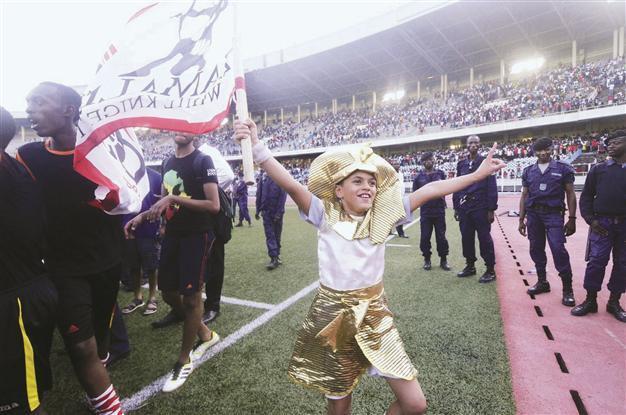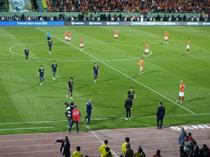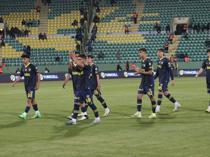Egypt’s banning of football fans from matches likely to boomerang
JAMES M. DORSEY

A young fan waves a flag as he celebrates Zamalek’s qualifying for the next round after the CAF Champions league second-leg round-of-32 football match aginst Vita Club of tne Democratic Republic of Congo. AFP photo
Egyptian authorities have expanded the ban on fans attending matches to include international as well as domestic games in a bid to prevent violence that is likely to backfire and spark renewed incidents in a country that is reeling from economic decline, widespread discontent and lack of confidence in the government and law enforcement.Sports minister Al-Emary Farouq announced the ban from international matches following incidents in African championship games involving crowned Cairo clubs Al Ahli and Al Zamalek SC as well as Ismaili SC.
The ban is certain to upset militant, highly politicized, street battle-hardened fans or ultras divided over verdicts announced in January and last month in the trial against those responsible for the death last year of 74 Al Ahli fans in a politically loaded brawl in the Suez Canal city of Port Said, and opposed to the already existing barring of supporters from recently restarted domestic matches.
The fans are further upset that their demands have yet to be met for reform of the country’s security sector as well as the putting on trial of law enforcement officials involved in the killing of more than 900 people in the last two years since the toppling of president Hosni Mubarak.
Their demand for justice could be addressed in the re-trial of Mubarak, his interior minister and six security chiefs. A court overturned on procedural grounds the verdict in an earlier trial in which Mubarak and Minister Habib Ibrahim el-Adly were sentenced to life in prison but the security officials were acquitted. An inquiry ordered by President Mohammed Morsi found that the military and the security forces concluded that the military and security had participated in forced disappearances, torture and killings of protesters.
Egypt’s Premier League was recently relaunched in the absence of fans after a suspension of a year in the wake of the Port Said incident that is widely viewed as an attempt that got out of hand by authorities to teach the ultras a lesson for their key role in Egypt’s popular revolt, sustained opposition to the military rulers who succeeded Mr. Mubarak.
The sentencing to death in January of 21 fans of Port Said’s Al Masri SC for their role in the worst incident in Egyptian sporting history sparked an uprising in the city that has long felt neglected and disadvantaged by central governments in Cairo. Al Masri and Al Ahli fans agree however that the police and security forces were spared with the sentencing of only two of the nine officers that had been charged in the case, the first two security officials to have been accountable for the deaths of protesters since Mr. Mubarak’s downfall.
The ban against the backdrop of political volatility, in which the ultras play a prominent role, complicates a tough choice facing the militant fan groups as well as youth organizations who formed the backbone of Egypt’s popular uprising: at what point do they surrender the power of the street and contentious politics and transition into electoral politics and non-governmental lobbying and activism?
Minister a former Ahli official
For now, the ban coupled with mounting resistance to Mr. Morsi because of his reliance on security forces and the military rather than outreach to his critics, his haughty style of government, a crackdown that last week culminated in the arrest and subsequent release on bail of the Arab world’s most prominent political satirist, a series of measures that curtail rather than enhance the role of civic society.
Mr. Farouq, a former Ahli board member, justified the banning of fans from international matches saying that the recent incidents “put the safety of fans at risk and damaged public property” and was necessary “to protect sports facilities.” Zamalek fans earlier this month destroyed seats at the military-owned Borg El-Arab Stadium in the Mediterranean port city of Alexandria, Ismaili supporters invaded the pitch and fought with police after a match against Algeria’s USMA, and Ahli fans threw projectiles and damaged the stadium during a game against a Kenyan club.
The ban is in line with Mr. Morsi’s refusal to see the uprising in Port Said, street protests in Cairo and other Egyptian cities and the role of the ultras as a consequence of a government policy that has allowed the economy to slide to the point of Egypt teetering on the edge of bankruptcy, a deep-seated distrust of security forces because of their role as executors of the Mubarak-era repression and their continued brutality and that appears more intent on consolidating the power of the ruling Muslim Brotherhood than leading the transition from autocracy to a more open and free society.
















